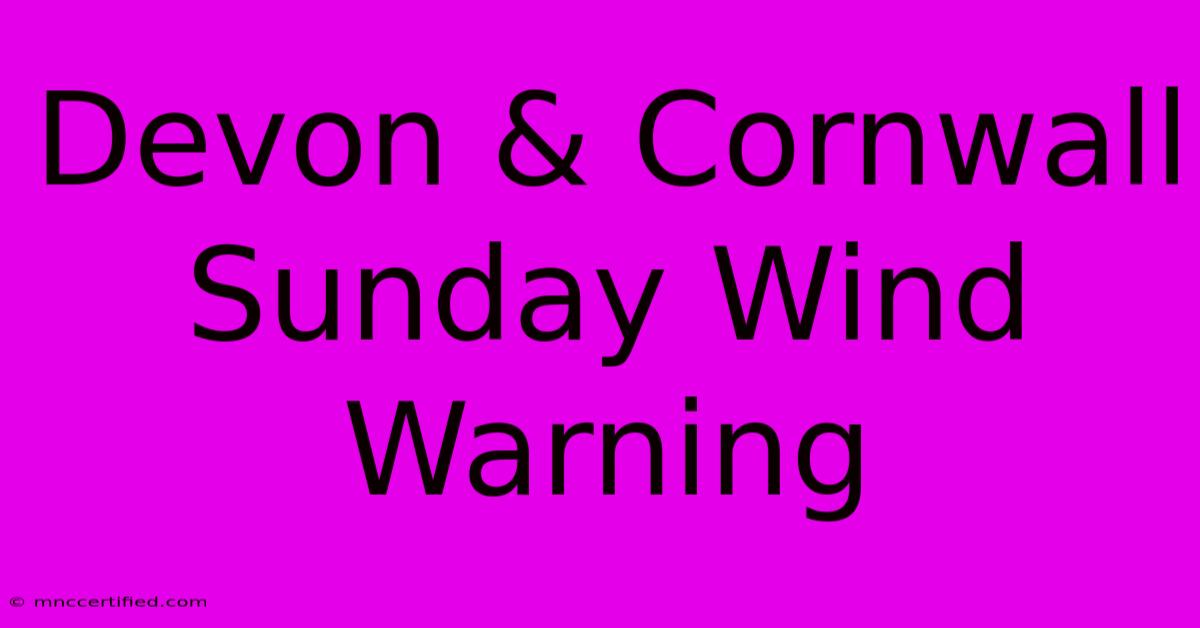Devon & Cornwall Sunday Wind Warning

Table of Contents
Devon & Cornwall Sunday Wind Warning: Staying Safe During Stormy Weather
The dramatic beauty of Devon and Cornwall often comes hand-in-hand with unpredictable weather. A Sunday wind warning for these regions isn't uncommon, particularly during the autumn and winter months. Knowing what to expect and how to stay safe is crucial. This article will guide you through understanding these warnings, preparing your home and property, and staying safe during high winds.
Understanding the Met Office Warnings
The UK's Met Office is your primary source for weather warnings. They issue warnings based on the potential impact of severe weather, using a colour-coded system:
- Yellow: Be aware – some disruption is possible.
- Amber: Be prepared – likely significant disruption.
- Red: Take action – dangerous weather is highly likely.
A Sunday wind warning for Devon and Cornwall, regardless of the colour, signifies potential strong winds affecting the region. These winds can cause significant disruption to travel, power supplies, and even damage to property. Always check the Met Office website for the latest updates and specific details for your area. Don't rely solely on social media for crucial safety information.
Preparing Your Home and Property for High Winds
Proactive preparation is key to minimizing the risks associated with strong winds. Here's a checklist:
Before the Storm Arrives:
- Secure loose objects: Bring in anything that could be blown away – garden furniture, rubbish bins, hanging baskets, children's toys. Secure anything that might be damaged by the wind, such as trampolines or sheds.
- Trim trees and hedges: Overhanging branches can be dangerous during high winds. Trim them back to prevent them from falling and causing damage.
- Protect windows and doors: Ensure all windows and doors are securely closed and locked. Consider boarding up vulnerable windows if necessary.
- Charge electronic devices: Power outages are a possibility during severe weather. Ensure your phone and other essential devices are fully charged.
- Gather emergency supplies: Have a plan for potential power outages. Stock up on essential supplies such as bottled water, non-perishable food, a torch, and a first-aid kit.
- Check on vulnerable neighbours: Elderly neighbours or those with mobility issues may need extra support. Check in on them before the storm hits.
During the Storm:
- Stay indoors: Avoid going out unless absolutely necessary. Strong winds can make it dangerous to be outside.
- Stay away from windows: Avoid standing near windows as they could be damaged by the strong winds.
- Monitor the weather: Keep an eye on weather updates from the Met Office.
- Report damage: If you experience damage to your property or see fallen power lines, report it to the relevant authorities immediately.
Staying Safe on the Roads in Devon & Cornwall
Driving in high winds can be extremely dangerous. If a Sunday wind warning is in place:
- Avoid unnecessary travel: Only travel if absolutely essential.
- Drive slowly and cautiously: Reduce your speed and maintain a safe following distance.
- Be aware of high-sided vehicles: These are particularly vulnerable to strong winds.
- Be prepared for sudden gusts: Strong winds can cause your vehicle to swerve. Be prepared for this and grip the steering wheel firmly.
- Check your route: Be aware of any potential hazards such as fallen trees or debris on the road.
Coastal Areas: Specific Considerations
Devon and Cornwall have extensive coastlines. High winds coupled with high tides can create dangerous conditions. If you live near the coast, take extra precautions:
- Stay away from coastal areas: Avoid promenades, beaches, and cliffs during high winds.
- Be aware of large waves: Large waves can easily sweep you off your feet.
- Monitor tide times: High tides combined with strong winds can cause dangerous flooding.
By following these guidelines, you can significantly reduce the risks associated with a Devon & Cornwall Sunday wind warning and ensure your safety and the safety of your property. Remember, preparedness is key to weathering the storm, literally! Always refer to the official Met Office website for the most up-to-date and accurate information.

Thank you for visiting our website wich cover about Devon & Cornwall Sunday Wind Warning. We hope the information provided has been useful to you. Feel free to contact us if you have any questions or need further assistance. See you next time and dont miss to bookmark.
Featured Posts
-
Who Is Lilly Jay Ethan Slaters Ex
Dec 21, 2024
-
Christian Walker Joins Houston Astros
Dec 21, 2024
-
Usyk Vs Fury 2 Start Time Ppv Stream
Dec 21, 2024
-
Olutayo Subuloyes New Contract
Dec 21, 2024
-
2024 Winter Solstice Date And Facts
Dec 21, 2024